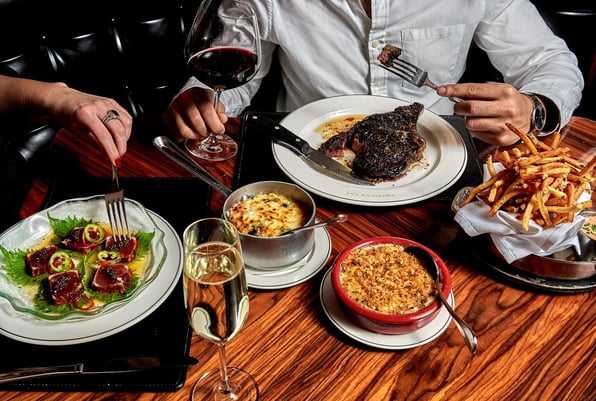With the continued growth of the competitive socialising landscape, the increasing popularity of the food hall model and the demand for interactive food experiences, it’s possible to see the direction of travel for the F&B sector as a whole.
As social and interactive elements become more prominent across the F&B sector—we reflect on what’s driving this change and why it matters.
KEY DRIVERS
-
Feelings of isolation and loneliness are much higher than they used to be, according to several major studies carried out over the last decade. Non-digital social experiences at dining and entertainment venues provide opportunities for face-to-face interactions that many people crave.
-
There is a noticeable shift in attitude toward spending money on memorable experiences rather than material possessions even if it comes at a higher cost, led by millennials who are now coming into their peak earning potential.
-
The experience industry continues to mature, and its major trends and concepts are overspilling into adjacent segments, including F&B and hospitality.
-
The commercial viability of social F&B venues such as competitive dining concepts and food halls has not only been proven, but is largely considered the primary driver for footfall and profitability across major urban developments, malls, property portfolios and hotel hotspots.
THE GROWTH OF THE COMPETITIVE SOCIALISING MARKET

The competitive socialising market has seen a 38% increase in supply over the past five years, according to Mintel’s UK Competitive Socialising Market Report. And research by Technomic highlights a desire among 76% of consumers for venues that offer more experiential dining entertainment options.
This growing appetite for competitive socialising—involving core elements of competition, through games or interactive challenges—highlights a broader trend towards experiential consumption.
Competitive socialising venues are already a go-to for group outings and celebrations like birthdays or work social events, but as venues adapt their offerings with more flexibility for individual play and elevated food standards, we’re likely to see an increase in casual visitation as well as interest from a broader range of consumer groups.
Data from KAM’s Competitive Socialising Report 2024 also illustrates the major room for growth if venues integrate better food options. Specifically, expectations across all aspects of food in Competitive Socialising venues are currently very low, while 49% of respondents would stay and eat in a comp social venue rather than leaving afterwards if the food was better value for money.
Combining food and entertainment, the competitive socialising sector is now growing beyond its original formats into large-scale, high-impact and multi-experience venues that blend food and fun. Meanwhile, social media spurs interest in these highly engaging and shareable spaces.
FOOD HALLS AND SOCIAL DINING ENVIRONMENTS
.jpg?width=9375&height=6249&name=GavriilPapadiotis_AlMamlaka_20231109_155_4mb%20(1).jpg)
Food halls have proliferated worldwide, becoming central to communities as well as revitalising underperforming assets such as malls. This growth is largely driven by consumer demand for diverse food offerings, as well as the demand for inclusive, communal and social dining environments.
Modern food halls build on the classic model of traditional market halls while providing elevated dining experiences in open, diverse spaces. These venues offer high-quality ingredients and unique food concepts, appealing to food enthusiasts and casual diners alike.
Combining the classic charm of the traditional market hall with beautiful interior design and restaurant quality food offerings also elevates these venues into places that people find rewarding and special, not just a place to eat.
The excitement and atmosphere of these social hubs is what keeps people coming back.
Developers and operators of urban complexes now see food halls as a key strategy in shaping communities. This is especially the case in parts of the Middle East and Asia where entirely new communities and giga projects are being built from the ground up, with F&B at the core of their strategies.
CLASSES, WORKSHOPS, AND OTHER INTERACTIVE F&B ELEMENTS

Interactive F&B experiences, from coffee tastings and cooking classes to chef-led workshops, are increasingly popular. These activities provide hands-on engagement with food and drink, offering unique and memorable experiences for guests.
A survey by Eventbrite found that 67% of millennials are interested in attending tasting events, with spending on such experiences increasing by 21% in the last three years.
Additionally, the National Restaurant Association reports a 40% increase in cooking class bookings over the past five years, with millennials being the largest demographic interested in these experiences. This data underscores the growing demand for interactive and educational dining experiences.
This goes hand in hand with a new generation of food halls being developed such as Al Mamlaka Social Dining, featuring open kitchen layouts and spaces where diners can interact with chefs and participate in the cooking process. The approach transforms dining into a collaborative experience, breaking down the barriers between the kitchen and the dining area.
SHAPING FUTURE SOCIETIES THROUGH SOCIAL F&B

Ultimately the dining landscape is changing with consumers seeking more social, interactive, and engaging experiences.
Meanwhile, developers, urban planners, hotel operators and property asset owners now understand the strategic importance of F&B in driving footfall and achieving overarching commercial objectives—responding to this trend by increase in the percentage of F&B within total leasable areas and investing in the development of dynamic food hubs and clustered F&B venues designed to attract guests with diverse and social dining experiences.
-1.png?width=3330&height=698&name=TGP%20International%20Logo%20White%20(1)-1.png)



